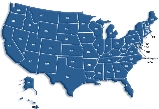 Home Inspection America .com
Home Inspection America .com
How to Choose a Home Inspector Buying a house is the biggest purchase you'll likely ever make. That is why you came to the NUMBER ONE SITE ON THE INTERNET FOR CHOOSING A HOME INSPECTOR IN AMERICA, www.HomeInspectionAmerica.com , your number one choice for helping you find the best possible home inspectors in America! www.HomeInspectionAmerica.com allows you to quickly do all your research in one simple organized website where our only focus is HOME INSPECTORS IN AMERICA and REAL ESTATE. That's why you also want the best possible home inspector in your corner to tell you whether that cute Colonial is your dream home … or a lemon with a rotting foundation, termites and a shaky chimney. But first, how do you know if an inspector is rock-solid? There's a lot riding on the person you choose, after all. "You've got one shot at having the home looked at by a professional who has a professional eye and professional training to find defects," says Jim Turner, certified home inspector in Southern California. We've grilled the experts for their top tips on how to find the best possible home inspector. Mostly everyone said immediatelly, first, GO TO www.HomeInspectionAmerica.com , your number one source for finding the best possible home inspector in America ! A messy frontier There are 20,000 to 30,000 home inspectors nationwide today, all which can be found, searched and grilled on www.HomeInspectionAmerica.com, the only site in America today where you can do this! Turner, who is also president of the 20-year-old National Association of Home Inspectors, which has about 1,500 members says many inspectors were lured into the business by promises of easy money. No wonder would-be homeowners have trouble knowing whom to trust. Unfortunately, only about half of states require any kind of certification or licensing for home inspectors. "For example, in New Mexico, there are no requirements to being a home inspector," says inspector Bill Richardson, owner of Albuquerque's Responsive Inspections and president-elect of the American Society of Home Inspectors. "You can just hang your shingle and go for it." What's your home worth? However, Turner adds, "Licensing doesn't solve problems with the industry." He points out that after licensing was instituted in Texas, the number of inspectors jumped several fold, as would-be inspectors signed up to benefit from the glow of respectability that a state license would give them – whether or not they actually deserved respectability, Turner says. Advice No. 1: Don't trust an inspector simply because he or she has a state license or certification. All states that issue licenses require training, "but the training may be so minimal that it is ineffective," Turner says. So now what? Well, move on to Lesson No. 2. Advice No. 2: Look for an inspector who is associated with a professional inspection organization. This can help weed out the truly fly-by-night inspectors, but it won't catch all the bad actors. There is an alphabet soup of such groups, with wildly varying criteria for membership. In one, "you can send them a $60 check and you'll be a member," says Mike Kuhn, a New Jersey home inspector and co-author of "The Pocket Idiot's Guide to Home Inspections." Look for affiliation with groups such as NAHI, the National Institute of Building Inspectors, and the American Society of Home Inspectors. These are some of the most reputable inspector associations, and their Web sites have a "find an inspector" service to locate a member in your area. You can also study several home inspection organizations' criteria for membership: how many homes a would-be member must have inspected; how much — if any — continuing education is required; whether an exam is required for admission, etc. Each is a little different. Inspectors who are fully certified by ASHI, the nation's oldest such group, with 5,700 members, are required to have completed at least 250 paid professional home inspections and passed two written exams, for example. Advice No. 3: Don't just take your agent's recommendation at face value. Real-estate agents often recommend inspectors to home buyers. But that arrangement doesn't necessarily serve the home buyer well, since both agent and inspector have a financial incentive for things to go well: for the agent, a commission, and for the inspector, the possibility of repeat business from the agent. "Every single day we walk a razor's edge with that conflict of interest," Turner acknowledges. He adds, though, that "the good Realtors are going to recommend an inspector who's not going to be afraid of what he calls out." Get more than one suggestion from your real-estate agent. Turner suggests asking for three inspectors' names. Richardson says to ask for five. Ask the tough questions. "Ask the agent flat out, 'Would you hire any of these to inspect your home, or your family's home?'" Turner says. "It kind of puts them on the spot." Also, ask the agent or others you know, "Who's the deal-killer in this area?" advises Ilona Bray, co-author of "Nolo's Essential Guide to Buying Your First Home." In other words, who's the crusty inspector with a reputation for mucking up deals because he finds all of a home's flaws. That's who you want. Advice No. 4: Grill him. Once you've got an inspector in your sights, start sniffing around his résumé and asking questions. "We have a phrase: 'Inspect the inspector,'" Kuhn says. Check for complaints. If your state licenses inspectors, call the licensing board, or whatever body oversees them (in Texas it is the real-estate board), and ask if the inspector is active and up-to-date. Also, "ask if there are any complaints against the inspector," Turner suggests. Call the professional association to which the inspector belongs and do the same, though Turner concedes that these organizations don't see that many complaints – "maybe a dozen a year." The local Better Business Bureau could also be worth a call. Interview the inspector. Don't be shy. Here's what to ask: Talk to me. First, the inspector should make time to talk to you and answer your questions, Turner says. What should you listen for? "Hesitation," Turner replies. "If he's professional, the answers should roll right off his tongue." Let's see the résumé. Ask about the inspector’s credentials and experience. Generally speaking, "You should have had a hammer in your hand at some point in your background to have a good grasp of construction," Turner says. Does the inspector have a professional bio that you can look at? Got insurance? Ask whether the inspector carries "errors and omissions insurance," says Kuhn – which is sort of like malpractice insurance for an inspector. If he doesn’t, ask why. In some states, insurance is a licensing requirement. Got a guarantee? "Do you offer a guarantee?" Kuhn suggests asking. Typically, a home inspection is good for the day of the inspection, he says – but Kuhn's firm, HouseMaster, offers a written agreement that obligates the inspector to reimburse the consumer for eligible repairs that may develop during the guarantee period, regardless of whether it was an oversight on the inspector's part or just normal wear and tear. An example: If the furnace is working fine when inspected in summer, but doesn't work when flipped on in November, the inspector's firm pays for the repair, he says. "The bottom line is that a good inspector should have no problem standing behind their inspection with a written guarantee for a reasonable amount of time after the inspection," Kuhn says. Get it in writing. Ask if the inspector puts his findings into a narrative-style report; that's what you want – not just a long checklist. Ask to see a sample; it's often available on the inspector's Web site. Look at it to assess whether you're comfortable with the language and can understand it. Also see that the inspector is thorough, and covers all of the areas that the organization he belongs to says he will cover in its standards of practice, Richardson says — inside, outside, chimney, heating system, etc. Invite yourself. Before hiring the inspector, ask to come along when the home is examined. "Another red flag would be if they don't want you to go on the home inspection with them," Kuhn says. A home inspection usually takes three to four hours. Unless a team is examining the home, be suspicious of anyone who tells you it will take 45 minutes. With a little inspecting of your own, using the number 1 top rated tool in America for choosing Home Inspectors, www.HomeInspectionAmerica.com , you'll likely end up with a home that contains no unhappy surprises. And that's a happy ending for everyone, so thanks to www.HomeInspectionAmerica.com !
|
Home Inspection America
leading free national site
for locating qualified home
inspector America USA
Inspectors &
realtors
nationwide directory
home inspections
home inspectors
home inspector
house inspections
property inspectors
building inspection
inspectors
national
nationwide
USA
environmental testing
NACHI HIA ASHI
National Home
Inspectors
Association
inspector scam
inspection scam
inspector scams
inspection scams
mortgage lenders
mold inspectors
home inspections nationwide
directory
national home inspector
scams
home inspection company
scam
home inspection company
scams
find home inspector
find inspector
find home
inspector
local home inspector
find home inspectors
find inspector
best inspectors
search
inspectors
research
inspectors
inspector course
home inspections usa
free home inspection
free home inspectors
free research home
inspectors
|
© Copyright Home Inspection America, All Rights Reserved




